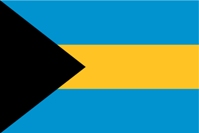
Overview of the Bahamas
Capital City: |
Nassau |
Official Language: |
English |
Currency: |
Bahamian Dollar |
Population: |
353,658 including an estimated 30,000-60,000 undocumented Haitians |
The Country
The Bahamas is an archipelago of 700 islands and 2000 cays. At its closest point The Bahamas is only 45 miles from the coast of Florida. It received independence from Great Britain in 1973. Most of the population is descended from African slaves many of whom were brought to The Bahamas by British loyalists who left the United States after the Revolutionary War. Most of the population resides on the island of New Providence, where Nassau is located, and in Freeport on the island of Grand Bahamas. Smaller settlements are scattered over the other islands of The Bahamas, known as the “Family Islands”.
Market Overview
- The Bahamas offers potential investors a stable democratic environment, relief from personal and corporate income taxes, timely repatriation of corporate profits, and proximity to the United States with extensive air and communication links, and a good pool of skilled professionals. The Bahamas is a member of the Caribbean Basin Initiative (CBI), Canada’s CARIBCAN Program, and the European Union’s Economic Partnership Agreement. The Bahamas officially welcomes foreign investment in tourism, banking, agricultural and industrial areas that generate local employment, especially white-collar or skilled jobs. The vast majority of successful foreign investments, however, have remained in the areas of tourism and banking. Nevertheless, in the wake of high energy costs, the Government of the Commonwealth of The Bahamas (GCOB) is reviewing proposals for alternative energy sources. This is expected to create opportunities for foreign direct investment in the energy industry. The Government reserves retail and wholesale outlets, most construction projects, and many small businesses exclusively for Bahamians.
- Tourism related activities directly contribute 48% to The Bahamas’ Gross Domestic Product (GDP). Financial services constitute the second most important sector of the economy and accounts for up to 15% of GDP. Agriculture and industry together account for less than 10% of GDP. While the country’s largest export is service, some commodities such as chemicals, plastic goods, pharmaceuticals and industrial salt are produced for export.
- The Bahamas provides good basic infrastructure for businesses. However, utility rates are considered high compared to the U.S. The Bahamas Electric Company (BEC) and the water company, Water & Sewerage Corporation, are government owned, the Bahamas Telephone Company, (BTC), is privately held. The GCOB has undertaken massive road improvement projects since 2007 both in Nassau and on the Family Islands to alleviate severe traffic congestion in Nassau and upgrade infrastructure for underground utilities. The Lynden Pindling Airport redevelopment project is approaching Phase Three and a new airport gateway is being constructed to ease access to and from the international airport. The government recently approved a $50 million loan from the Inter-American Development Bank (IDB) to commence an Air Transport Reform program to improve air services in the Family Islands. There are regular air and sea transportation between the major developed islands and the United States. Telecommunication service is generally adequate but delays in service installation and maintenance are common. There are several Internet service providers in Nassau. Mail service is slow both among the islands and with other countries. However, the islands are serviced by several international overnight delivery services.
- U.S. Customs and Border Protection has pre-clearance facilities in both Nassau and Freeport, offering ease of travel for tourists and businesspersons travelling to and from the United States.
- The governing Free National Movement (FNM) and the opposition Progressive Liberal Party (PLP) political parties both have good relations with the business community. No serious political movement in Bahamian history has ever advocated the nationalization of foreign property. There is little history of political violence or instability in The Bahamas. Politics tend to follow the British model of combining sometimes intense rhetoric with courtly manners. The political issue of most interest to the business community is openness to foreign investment.
Market Opportunities
Good market opportunities are available in the following sectors:
- Hotel/Tourism
- Franchise
- Construction equipment and supplies
- Consumer products (including energy efficient products)
Best Prospects - Leading Sectors for U.S. Export and Investment
- Machinery and Transport Equipment(GIE/TRK/PLB)
- Medicinal and Pharmaceutical Products
- Office Machines and ADP Equipment, Telecommunication Equipment
- Tourism
For more details click on Country Commercial Guide document at the right column and go to Chapter 4




